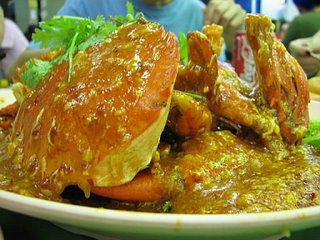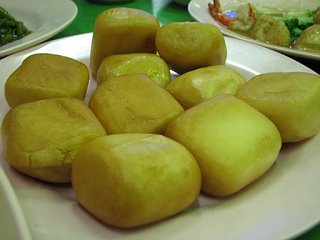Wednesday, December 27, 2006
Enjoy your work(.)(?)
And when asked that dreaded question Do you like your job? I am inevitably at a loss of words. I become hesistant. As with so many questions in life, it's never a clear-cut Yes or No. Even to my colleagues whom I know silently measure me by my words, I never offer an enthusiastic 'yes' even though this would have been a politically-correct and easy answer. I have to be truthful with myself.
I once heard that in order to get the job you want - it was at a career seminar - you need to have three As: Aspiration, Ability, Action. You need to have a goal, an aspiration which sets out what you want to achieve. Then you need to possess the abilities required to help you achieve your goal. So for instance, a person who desires to be a doctor must possess medical skills; someone who aspires to be a writer would need to have real writing abilties. As for action, it is necessary to help translate your abiltiies into real output, to materialise your dream, so to speak.
But what if I want to achieve something but i realise i only possess two of the three As? What if i aspire to be something, i worked for it - but only to realise that I lack the ability? The purpose of the three As as a concept is that it helps us manage our expectations and make realistic decisions about what we want and can do in life.
I also came across a blogger who wrote: What you are good at, you may not enjoy doing; what you enjoy doing, you may not be good at.
How true.
Sunday, December 17, 2006
Times have changed
Saturday, December 16, 2006
Feeling out
They recounted scandals of classmates, traded comments, shared knowing jokes, and contested opinions; I tried my best to look comfortable and involved, recalled hard some of the names that surfaced, and smiled weakly when smart jibes and jokes were exchanged. Their openness and unreserved comments spoke of the camaraderie that was forged in the past few months, during which their interaction must have been intense and extensive, as necessitated by the structure of the course; my silence and loss showed the extent to which i had distanced from them and from studies.
As the night stretched on, it became more painful for me. I couldn't partake in the conversations because I barely knew the issues and people they spoke about. They talked with much vigour, laughed heartily, while I looked cheerless, tired from the long day at work. It was all the more awkward for me because we were a small group, huddled round a retangular wooden table with drink bottles and unfinished pizza on it. And so i could only sit and listen, hoping my odd presence would be forgotten. I thought of leaving early a few times but decided against it as that would only reveal my uneasiness and accentuate my sense of alienation. But I wasn't deluded: much as i knew how out of place i was, they must have also felt the same of me; decorum forbids them to make any mention of my obvious silence and displacement.
Finally time was on my side. Sensing it was an appropriate moment to announce my departure, I excused myself and told them i had to catch the last train - which was true. I bade them farewell, the host thanked me for coming, then I walked down the slope and out of the gate, hastening my steps as I moved further away from them, further from the isolation and sense of unbelonging that engulfed me the whole time i was there.
Thursday, December 14, 2006
work and movie
All (three) in a day
I looked up from my seat and instantly, I recognised the lady. She was one of the first to enter the train, no doubt because she must have waited at the edge of the platform where she would be able to enter first. Quick and determined, she moved quickly towards the centre of the carriage and stood with her stocky frame firmly before me. Within a few seconds, whilst some people were still inching their way in at the doors, she had already taken out her book - a chinese romantic novel, it seemed, the type that has words running from top to bottom, right to left - and continued where she had last finished.
At the next station, the person seated to my left alighted, and she moved to occupy the seat. Nothing special or unusual about the lady, just that this encounter had occurred the day before, exactly as it had happened today. On two consecutive mornings, i was to meet the same lady who stood before me, then sat next to me after my neighbour alighted, and on the same side of me to boot. I wonder if she had noticed the young man next to her was the same person she stood in front of and then sat next to in two days.
TWO. Lunchtime. We took a cab to Bugis Junction for lunch. I was mildly surprised at bumping into her (my secondary school classmate) and even more surprised that she was in casual clothes more suited for wearing at home. But that still wasn't the most surprising thing.
"Aren't you working today?" I asked.
"Oh, I had my wedding banquet here (Hotel Continental) yesterday," she smiled.
"You were here for a wedding banquet yesterday?" I queried, not sure if i heard the right thing, but no doubt sounding very silly.
She smiled even more cheerfully, then repeated somewhat more slowly, "I had my wedding banquet here yesterday."
My eyes widened as I offered my hand to congratulate her. It was an afternoon like any other day. But today I met a former classmate, same age as me, who just tied the knots yesterday, and is now a wife of somebody. Of course she's not the only person of my age who I knew has renounced her single status. But it was nevertheless a huge surprise to meet a friend who's newly married just a day ago. I was introduced to her husband - a fine young chap who spots an honest, well-mannered look. My friend had just deposited what must be a generous sum of ang pow money received the night before. For she was all smiles throughout our conversation.
THREE. On the train, again. I - seated down, again. The train doors opened, and a familiar figure moved past me towards the centre of the carriage. I slapped her hand lightly; she turned and greeted me with a surprised look.
"See, it's fate that we have to meet this week," I happily remarked. (Val wasn't able to join the group of us for dinner on Sat.)
I was tired but happy to catch up with her for the rest of the journey.
So much for coincidence. All in a day.
Monday, December 11, 2006
Trivia
Sunday, December 10, 2006
Sat late night
Monday, November 06, 2006
Jingle bells, jingle bells...
Tuesday, October 17, 2006
In transit
Monday, October 16, 2006
Re: MM Lee's remarks and his reply to Malaysian PM
MM Lee's reply to Malaysian PM Abdullah was published in the ST on 3 October. There are a few insights to be gleaned from the contents of his letter and its impressive annex.
It was obvious right from the start that MM Lee's remarks would not be to the liking of Singapore's neighbours. Yet, I believe, it was never MM Lee's intention to criticise them. (I am not saying this in defence of him; indeed i believe Singapore, in terms of its bilateral relations with its neighbours, would do better without those remarks from the MM.) He was being merely characteristically blunt and candid, and by pointing out (in his letter to Malaysian PM Abdullah Badawi) that he made those remarks in a "free-flowing dialogue", it was meant to convey the message that they were not made as criticism.
One may recall that MM Lee made those controversial remarks at a diaglogue on good governance. Though the ensuing controversy was in the main about race relations in Singapore's neighbouring states, relevant to the context in which he made those remarks, he made an important point on the kind of government Singapore needed owing to its geo-ethno environment: it was a government that was "really firm, stout-hearted, subtle and resolute". However, this message was ultimately drowned by the reasoning MM Lee provided to prove his point. In a somewhat ironic twist, the ensuing furore in Malaysia created a situation that seemed apt for MM Lee to demonstrate the essence of his remarks. His published reply to Malaysian PM Abdullah Badawi - made in a personal capacity, not government - seemed to bear out his advice.
At the dialogue session before a foreign audience who were in Singapore attending the IMF/World Bank meetings, MM Lee made reference to racial relations in neighbouring states to explain why Singapore needed a "firm, stout-hearted, subtle and resolute" government; such a government is needed in order to manage the Republic's relations with its neighbours. His view is that the attitude of Malaysia and Indonesia towards the Republic is shaped by their treatment of their minority Chinese. He had no need to make use of that occasion to pass those remarks as pointed criticism for a Malaysian or Indonesian audience, much less to court controversy or provoke anger - for he had merely repeated a position which he has always maintained, which is public knowledge. This was why in his letter he mentioned, significantly, that "I have not said anything more than what I have said many times before".
(But MM Lee more than anyone else should be acutely aware that for a topic as volatile and sensitive as racial politics, people are not given to cerebral and level-headed thinking. Aggrieved parties would likely find cause with his statement while those in power would vehemently refute it.)
More interestingly, his letter to Malaysian PM Abdullah Badawi reminded one of how much he is still the firm, legalistic and formidable politician who more than any Singaporean was personally and inextricably embroiled in bilateral politics between Singapore and Malaysia since their separation in 1965. His impeccable mind and steadfastly-held beliefs are apparent in his letter. He knew the Malaysian media well and knew that nothing short of an apology ("sorry") would ameliorate the damage his remarks had inadvertently caused. Indeed, Malaysian papers reportedly gave front-page prominence to his apology to PM Abdullah for causing him 'a great deal of discomfort'.
Yet, as most would have noted, MM Lee was 'sorry' for the discomfort that his remarks brought on the Malaysian PM, not for his view on how the Chinese minority were marginalised. He did not change his view, and PM Abdullah in his public reply noted that too. In fact, true to his lawyer credentials, his letter carried an impressive annex that produced evidence supporting his expressed position. For the discerning reader, the detailed information in the annex, presented in a matter-of-factly manner, was meant to address various charges, including but not limited to those that criticised MM Lee for interfering in Malaysia's politics.
MM Lee said that Singapore needed a "really firm, stout-hearted, subtle and resolute" government to maintain relations with its neighbours. His letter, which underscores his response to an official reaction from neighbouring states, showed what and how it takes to be all that. He was 'firm' and 'stout-hearted' in that despite the unhappiness and furore that erupted in Malaysia, he held on to his position and explained the context in which he made those remarks, thereby registering the point that he, as a leader of Singapore, was not making remarks which had no basis whatsoever; he did not retreat. He was 'subtle' and 'resolute' in that he understood what is at stake - the possible jeopardising of bilateral relations - and made an apology without compromising his integrity. And thus he ended his letter saying, "after a decade of troubled relations with your predecessor, it is the last thing i wanted." This is an acknowledgement of the improved relations Singapore has enjoyed with Malaysia since PM Abdullah took over Dr Mahathir as Malaysian Prime Minister, and it also subtly reiterates the point he wanted to impress upon PM Abdullah Badawi and others: that he said those remarks not to provoke, nor to inflame feelings, and certainly not to undermine bilateral relations.
That the matter did not become yet another bilateral problem and is now closed is to the good of bilateral relations between both states.
Wednesday, October 11, 2006
Caged Indifference
He kept the bag close to his legs, and he did this with little fuss. It was merely a few seconds from the time he sat down to his making some minor adjustments – indeed, it couldn’t have been more than five seconds. All this while, and after having settled down, he kept a curiously nonchalant look, never turning his head once to check if his neighbours might feel any discomfort with the unusual items in his possession. There’s a certain focus and swiftness about his actions that suggested that he carries those cages and travels on the train quite frequently, perhaps on a daily basis.
His neighbours were a middle-aged lady, seated to his right, and, on the other side, a young man who looks around thirty-years old. The latter was asleep, his arms folded and his head resting against the windowpane. The lady seemed unbothered by the bird cages at first, until a distinct chirping sound emanated from the cages. This caught her attention, and she started to glance discreetly, almost awkwardly, at the bird cage next to her, as though she were looking out for the flight of the chirping animal from its enclosure. She was guarded and restrained, looking out from the corner of her eye, conscious not to reveal to her stern-looking neighbour her sudden-found uneasiness.
As the chirping persisted, so did her furtive glances; it had her complete attention for the rest of the journey. Yet her silence and disconcerted gazes did not grow into any overt displeasure. She seemed uncomfortable having to travel alongside an unexpected creature on an afternoon train ride, but it must have been bearable - for she had continued to remain where she was, even if she were silently suffering.
Meanwhile, the old man had the bird cage firmly held on his lap, his countenance impassive, body erect. He was oblivious of the sideward glances his neighbours had been casting by all this while. Whereas the lady was visibly affected by the bird cages and the sounds that came from them, he, placidly still in his seat throughout, was her perfect foil. Or, one wonders, was this a practiced indifference? The young man next to him was undisturbed, indulging in a nap that was uninterrupted by chirping sounds next door.
A few stations later, the lady got up and disembarked, finally relieved of the indignity of having to sit next to some birds on a train. At this moment, the old man sprang into action, as if suddenly awakened from a spell. He moved quickly to his left to occupy the lady’s seat, which was at the corner of the row. Displaying the same swiftness as he did when he first sat down, this time he could afford more room to move his legs. He looked around for a while, and appeared satisfied in his new seat.
No one took the seat next to him after that, at least not until I got off the train a few stops later. I wonder how many stations more would it be before the old man finally alighted – with the bird cages and the chirping bird(s) inside them.
Wednesday, October 04, 2006
New books!
1. Singapore: The Air-Conditioned Nation by Cherian George
2. The Harmony Silk Factory by Tash Aw
3. Midnight’s Children by Salman Rushdie
The last book is still wrapped in plastic. I haven’t torn away the plastic because I know it will be some time before I get on to it. So I might as well leave it as that, so that it will stay in its pristine condition. The other two, I have dutifully attached a protective plastic sheet over its exterior cover, as I do for all the books that I’ve bought.
My friend once remarked that it is wasteful to buy books. Why buy them, especially novels, storybooks, when you are only going to read them once? You can get them from the library.
Actually, she kind of replied her own questions. I buy books because I, as someone who enjoys reading, like to possess books. The library is a wonderful place, but past experiences have shown that the books that I want are somehow always on loan. I am too lazy to take note when the loaned book would be returned, too lazy to make another trip to the library to get the book if and when it’s available. More important, when I look for a particular book, it is most likely that I want to read it there and then, not some weeks or months later. I am that impatient.
And whoever says people only read books once? I make sure the books that I intend to buy are worthy keeps. And every now and then, I do browse my bookshelf, pick a book, flip the pages and perhaps read a few paragraphs. There are other books which I do read all over again, still others which I would read once more had I the time and the mood.
These are sufficient reasons for me to buy books. I told my friend that compared to buying clothes and fashion accessories, or indulging in other pastimes that can be equally, if not more, expensive, buying books is a worthy investment and hardly qualify as wasteful. The pages of a book yellow over time, yes, but the contents do not diminish in value, as compared to clothes and other things which depreciate in value after awhile. Instead, a great novelist’s work remains intact and is ripe for a revisit anytime.
Finally, I suspect that buying and maintaining a shelf of books is also something egoistical, to satisfy a book lover’s sense of snobbish pride, as in, ‘I read all these books, you know.’ So yes, I read all those books I have, you know...except that quite a couple of them are, err, half-read. Ah, all pretences fall apart…
On another note, I’ve started reading Tash Aw’s The Harmony Silk Factory, and it certainly looks promising. The front cover has a quotation from the respectable writer, Doris Lessing who writes, ‘What a storyteller Tash Aw is. Unputdowntable.’ I got acquainted with the writer through a Straits Times feature quite a long time back and I recalled that his first novel was quite well-received. Then I came across the book at Borders that day – I was specially there to utilize two 30% discount coupon which I ravenously cut out from the papers – I flipped a few pages, found it rather interesting after reading the synopsis and a few paragraphs, decided that I shall buy it. And you know what, walking out from a bookstore with a good book that one has just paid for and is now its proud new owner, makes one silently jubilant, as if one had just surreptitiously witnessed the embarrassment of a foe and delighting in the fact. All right, I’m not sure if this is exactly the best of analogy though. Whatever.
Tuesday, October 03, 2006
Singapore Media's silence on MM Lee's remarks
Minister Mentor Lee Kuan Yew on 15th September, at a dialogue session held on the sidelines of the IMF/World Bank Meetings in Singapore, made some comments which critiqued the treatment of Chinese in Malaysia and Indonesia. He said: “My neighbours both have problems with their Chinese. They were successful, they're hardworking and therefore they are systematically marginalised, even in education. And they want Singapore, to put it simply, to be like their Chinese, compliant. So every time we say 'no' to some scheme to knock down the Causeway and build a bridge, he says 'Oh, you are not cooperative' You are only thinking of yourself.”
His comments were construed as alleging that both Malaysia and Indonesia deliberately discriminate against their minority Chinese by holding them in a subordinate position. The comments have since earned the ire of politicians of Malaysia, with Indonesia apparently lodging complaints later than the former. Malaysia’s Mahathir Mohammed has hit out at the remarks, while other UMNO politicians have similarly expressed indignation over Lee’s remarks on the treatment of ethnic Chinese in Malaysia.
According to the Straits Times Thursday (28 September), KL and Jakarta have asked for explanation for MM Lee’s remarks (‘KL and Jakarta ask for explanation for MM’s remarks’). Malaysian Prime Minister Abdullah Badawi has written to MM Lee seeking an explanation while Singapore’s Ambassador in Jakarta had been asked by the foreign ministry to give an explanation. Meanwhile, debate rages on in Malaysia not only over MM Lee’s making of those inflammatory remarks, but also over the truth, or untruth, of his opinion.
ST – Reports but no analysis
It is instructive to note that whereas Malaysian papers (from what I understand) have all given prominent attention to the issue, the Singapore Press in comparison have been relatively silent, with the ST filing reports on the issue under its Malaysia section instead of under prime news. The ST does report on the developments of the issue in Malaysia – who and which politician says what as well as the response of the public, for example, the Chinese – but these have strictly been presented as news reports, not commentary nor analysis articles by its columnists. Certainly, the establishment press has not joined in the fray by openly discussing the veracity of MM Lee’s remarks, not to mention their political ramifications. This is not surprising, and there are two reasons that may explain why.
Firstly, there has been no official reply from MM Lee with regard to the controversy that his remarks generated in Malaysia and Indonesia. It is just as expected that no cabinet ministers or government officials have made any comments, at least not which the public know of. The ST, being the national daily that reflects (or is deemed to reflect) the Republic’s position on matters of national importance, is unlikely to be ahead of the government in commenting MM Lee’s remarks or in examining the issue. For what it says and how it frames and reports the issue – as with other sensitive national and foreign policy issues – can affect how foreign governments and their citizens perceive the national and government attitude towards the issue.
Certainly, the ST would not want to add fuel to fire by commenting on the implications of MM Lee’s remarks ahead of clarifications from the latter himself or the Singapore Government. This would ensure that it does not run the risk of aggravating matters, especially with regard to a topic that is perhaps best left to academics and not discussed in the public sphere. By and large, the establishment press and the government play mutually cooperative role when it comes to issues relating to foreign policy: the media understands the gravity and sensitivity of foreign relations and do not – is expected not to – run afoul of the government’s authority and position on foreign affairs by purveying a separate or contradictory position.
Secondly, the Straits Times conscientiously avoids presenting every putatively minor bilateral spat or unhappiness raised by Malaysia as front-page news, so as not to elevate their importance and thereby politicizing the issue. The political consideration underlying this unspoken practice is simple, and a sensible one: given the political sensitivity of bilateral relations and the ST’s national role, it is almost imperative not to give prominence and focus to every piece of news relating, even if relatively significant, to Singapore-Malaysia relations, which are perennially delicate. Doing so could invite unnecessary scrutiny and inadvertently provide fodder for interested parties to impute political motivations.
One example would be the reporting of crimes in Johore by local newspapers during a certain period in the past. Some officials from across the causeway have at one point in time suggested that the media here were pursuing a hidden agenda by what they deemed as biased reporting on crime reports in Johore Bahru involving Singaporeans. While it is in all likelihood that newspapers here have a sensible reason to give greater prominence to such crime reports – they are sensational and thus commercially newsworthy – this may not be what officials in Malaysia think.
On the other hand, positive bilateral developments or news are often given front-page prominence to foster positive atmospherics. (Think, for example, Singapore ministers’ visits to Malaysia during various festive occasions.) Thus, the reports of Malaysians’ response to MM Lee’s remarks have so far been dutifully filed under the less conspicuous Malaysia section and not under prime news. The truth of the matter is that Singapore-Malaysia relations are delicate and the media on both sides have a tremendous capacity to influence opinion and bilateral relations, for better or for worse.
Media and its political role in foreign policy issues
The ST, as well as other media, is acutely aware of the troublesome nature of MM Lee’s remarks. They can neither come out in support of his remarks by commenting on race relations in neighbouring states, nor are they any likely to comment on the wisdom of making those remarks, which, one should note, were intended for a foreign audience whom the senior statesman wish to draw attention to the geo-ethno realities confronting Singapore (and hence their supposed connection to governance in the Singapore case).
Doing either would be politically precarious and would most inevitably aggravate the situation and lead to a possible quick deterioration in bilateral ties. It is therefore expected that local newspapers have since the onset maintained a neutral stance, reporting disinterestedly on the reactions from Malaysia and Indonesia instead of publishing any commentary pieces by its own journalists. (It also bears mentioning that thus far, ST Forum has only published a letter relating to the issue from one of its readers.)
Politically speaking, the government and the media know that MM Lee’s remarks, whether justified or not, have the potential of making yet another diplomatic fiasco, and the best they can hope for now is that the issue would die away over time, after MM Lee makes his response. (The Malaysian Government is not wrong in saying that MM Lee’s remarks can incite racial feelings in Malaysians, particularly amongst the minority Chinese, and MM Lee’s making of those remarks cannot but force his Malaysian counterpart to make an official response.)
Note: With regard to the above discussion, one may wish to draw parallel to another figure’s remarks which have engendered world-wide reaction. Pope Benedict XVI’s recent speech on faith and reason had quoted a line from an obscure 14th-century Byzantine emperor, which earned the ire of Muslims world-wide. The ST has since reproduced his entire speech (ST Review, 25 September) and carried articles of academics and its journalists alike.
Arguably, the controversy involved sensitive religious matters just as MM Lee’s remarks touched on sensitive racial relations. However, unlike the prominent commentary and analyses given to the Pope’s speech and its consequences, the ST gave inconspicuous coverage of MM Lee’s remarks and the furore which ensued in Malaysia and, to a lesser extent, in Indonesia. This only underscores the nexus between bilateral relations between Singapore and its immediate neighbours and the media in the sensitive foreign policy arena
Addendum: This was written before MM Lee made his response to Malaysia PM Abdullah Badawi. MM Lee's reply, understandably, has been filed under Prime News in the ST, though not given front-page coverage. As it is, his reply and PM Abdullah's response were reported in a straightforward manner, without any commentary. The Malaysian Government have decided not to pursue the issue, after the PM said to the Press that he has 'noted' MM Lee's reply.
Monday, October 02, 2006
Book meme
Taken off: Trisha Reloaded
1. One book you have read more than once
Geroge Orwell’s Nineteen Eighty-Four. It’s a classic, and rightly deserves to be read more than once. The book’s famous for the totalitarian state that Orwell so brilliantly depicted, providing insights into the nature of (state) power, which can subvert reason and human passion. It is also a good work of fiction – Orwell’s lucid writing, as with his other works, makes for a good read.
2. One book you would want on a desert island
Life of Pi by Yann Martel. I don’t know, but this is a book whose amazing story would likely be able to provide psychological comfort, optimism and strength to one on a desert island. On the other hand, I wouldn’t mind having The Orwell Reader: Fiction, Essays and Reportage – I can never get enough of Orwell’s excellent prose.
3. One book that made you laugh
Pride and Prejudice. Thankfully there ever was a Jane Austen, who wrote this extremely delightful book. I can’t recall another writer who displays such immense wit in his/her writing, so elegant and vivacious, dripping with irony at every turn of the page. She gave us the ridiculous Mr Collins and lively Elizabeth Bennet, both of which characters one will always recall with pleasure.
4. One book that made you cry
Angela’s Ashes by Frank McCourt. McCourts’ autographical account of his childhood is at once funny and poignant, stirring at one’s heart with his self-deprecating humour. His writing is heartfelt and draws great empathy from the reader who feels for his remarkable Irish childhood years.
5. One book you wish you had written
Immortality by Milan Kundera. Though Kundera wrote in Czech and it is the translated version that I read, I am drawn by his power to weave a story and tell it from the perspectives of his different protagonists. His novel, and the way he writes, makes you ponder about life; it is through his writing that I learn to see how life is strung together by events and coincidences that play out and link with one another. One incident, one inconsequential act, begets another, and another – eventually, they assume a course and become the narrative of one’s life.
I would also have wished I had the genius of story-telling like Roald Dahl, who, in his book Tales of the Unexpected, wrote in a compelling manner and with subversive wit.
6. One book you wish had never been written
I would like to think that I read books only after ascertaining that they are more or less worthy reads, so I can’t think of one which I wish hadn’t been written. In truth, I am hardly a well-read person, so it means I am not acquainted with a large pool of known works to be able to submit one for this. In any case, if a book (in my opinion) is boring or poorly written, I wouldn’t have gone on to finish reading.
7. One book you are currently reading
I’m currently reading a non-fiction and a fiction work:
Contentious Journalism and the Internet: Towards Democratic Discourse in Malaysia and Singapore by Cherian George, and
The Namesake, by Jhumpa Lahiri
I first read Cherian George when I was doing research on Singapore politics. As an establishment journalist-turned-academic, he writes thoughtfully and offers some very lucid insights into local politics. The other book is a debut novel by its author. As The Times wrote of the book, ‘Extraordinary…a book that spins gold out of the straw of ordinary lives’ – I can’t agree more.
8. One book you have been meaning to read
The Old Man and the Sea by Ernest Hemingway. Also, I have been meaning to pick up Lolita and finish reading where I left off. It’s been so long I think I need to start all over again.
9. One book that changed your life
No, I haven’t read any book which I can honestly say has changed my life. Different books I’ve read may have affected me in some way, but not to the extent of the sort that would qualify as life-changing. Perhaps, I’ve not yet met with any momentous events in life which could have just provided the occasion for a particular book to inspire me in a life-changing sort of way.
Sunday, October 01, 2006
Yesterday's ride

It's one of those rides where i wish time would come to a still, so that i can take forever to enjoy the beautiful scenery, soak in the atmosphere, enjoy the rare moment of being oblivious to all matters except the scenery that surrounds me. Photo courtesy of K.
Thursday, September 28, 2006
Tuesday, September 26, 2006
Riding to Unreality
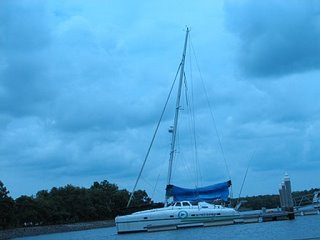
It is breezy; not only could one feel but hear it: the wind chime’s making soft, tinkling sounds, almost surreptitiously, as if it were afraid of intruding upon the silence of the place. From the verandah, the view is one of peaceful serenity. A river runs adjacent to the villa, its flow gentle and calm, beckoning one to leap into it (which I did the second day). Over at the other side of the river, an expanse of trees and grassland completes the picture of tranquility. When a motorbike and a van inconspicuously emerge from one end, one is somewhat surprised by the fact that a dirt track (or perhaps a paved road?) runs through the vast expanse of greenery. Distance provides concealment, but also gives a measure of comfort.
A concrete pillar fence, at waist-level height, separates the garden from the outside area. But it’s an inconsequential barrier. The exterior seems like a natural extension of the villa, merged seamlessly with the veranda and the cozy living hall, all three linked by an invisible passageway of open space, allowing unhindered wind movement. One hardly feels the confines of the garden, which is sparsely but simply adorned. At a corner there is a wooden rocking horse, quaintly charming; a large portrait, painted in melancholy blue hues, hangs on a wooden frame behind it; and next to it sits a sturdy wooden bench. Part of the lawn has been replaced by wooden planks, complementing the furniture and architecture of the villa. The ambience is snugly languorous, a much appreciated fact that doesn’t take long to register in the first-time visitor of the luxurious villa.
I stand on the verandah, letting the breeze caress my face as I admiringly take in the idyllic surroundings. Evening came, and Kenneth and I take a stroll along the pathway that runs alongside the river. There is no brilliant sunset, just a blue evening sky that is fast turning dark. As the river broadens and leads to the marina, two neat rows of stationary yachts and small boats come into view. Against the blue sky and with their reflections gleaming shakily in the water surface, it is a calm and beautiful sight to behold. Each time I find myself in such an environment, where nature abounds, I am filled with an inward peace and elation that is tinged with a certain sense of wistful yearning. Perhaps it is the realization that such moments are transient which evokes these paradoxical feelings, though the joy of being in that moment is never quite diminished. There’s a certain sense of unreality, of being disconnected from the world that you are more accustomed to than the one you now find yourself situated in. Being in a foreign place, with little else to do, I realize, can be a rehabilitative experience.
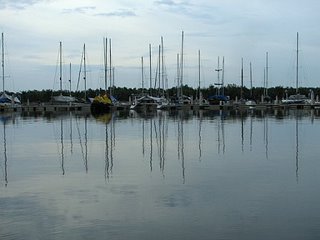

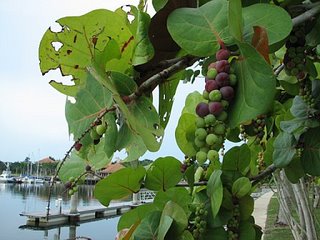
Early in the morning we had ridden across the causeway to Kota Tinggi, where we had roti prata for breakfast. I had done the same thing a week ago. This one, coming so soon after the last, incurred the displeasure of my Mum, who never liked the idea of my cycling on Malaysian roads. She ought to be comforted to know that Malaysian drivers are generally more friendly and respectful of cyclists as road users, and the roads in the Eastern side (which is where most cyclists ride) have fewer cars. But no, I don’t explain matters, because that will only invite more counter arguments that can’t be rationally retorted. It’s just the nature of all mums which makes one sometimes acquiesce to their demands, or sometimes keep quiet and let (their) ineffectual protests give way to grudging resignation.
I didn’t have any prior expectations of the ride, which I can’t decide whether it was a good or bad thing; for after breakfast, the terrain was hilly all the way to our destination. The gentle but long sloping roads had the three of us pedalling uphill slowly, and even more slowly after we glided down only to climb yet another sloping road. Because I did not know what to expect, I hadn’t any mental preparation but merely kept going, without any sense of dread or anticipation. We were very fortunate, though, that the weather was wonderfully cool for the most time, especially in the early morning; there were abundant clouds shielding us from direct sunlight, otherwise the ride would most certainly have been torturous, what with a killer combination of hilly terrain and blazing heat.
Cycling behind K, it’s amazing how he kept yawning with such rapid consistency, as though he’s a machine made to release explosive yawns every few minutes – yes, every few minutes, the whole morning! “I slept only 4 hours last night,” he would repeat this for the rest of the day, whenever he’s reminded of his incessant yawns. Along the way we met other cyclists, including a group of 30 cyclists who were spread far apart one another. Nearly all of them were from Singapore, and the latter group apparently was a cycling group from Punggol-Yishun. Some of them would most certainly qualify as senior citizens, and Kenneth, himself a veritable ‘Uncle’, called them ‘Senior Uncle’. I was so amused. I told him this is a comforting fact; it means when we are their age we can still cycle like they are now, and that is surely a reassuring prospect.
We were almost despairing when after cycling more than 120km the destination still seemed nowhere in sight. Our butt was aching, wrists hurting, back aching – just about every part of the body is in pain. When we saw the much-anticipated signboard, we were at once filled with hope; but hope soon gave way to helpless resignation as it was another 6km – Kenneth noted the distance at the end – after making a right turn before we finally reached the villa.
Post-ride was very good, not least because we stayed in a wonderful villa at a quiet location. I ate delicious lobsters at Sungei Ringett, had toasted bread with Ya-Kun kaya for breakfast and home-cooked pasta with yummy smoked sausages for lunch. I also watched Elektra, laughing together with the rest at its oh-so-amazing special effects, more hilarious than they are spectacular. Finally, of course, I also took a dip in the cool river and the pool, but not before canoeing with Kenneth down the river, to the marina, where we went between two parallel rows of yachts and boats.
Good things do happen every now and then, and when they do, it’s best to enjoy every moment while they last. I didn’t return to Singapore feeling reluctant to leave the place, because while I was there, I completely enjoyed myself, doing nothing, lounging on the sofa, enjoying the breeze and everything else. If only every post-ride could be similar to this…

Monday, September 18, 2006
N(o)73
I must confess I am very tempted to own one myself. Not that I would readily upload my photos to Flickr straight from the phone if I do use it, but the 3.2megapixel in-built phone is proving very irresistable for folks like me who like to snap pictures anytime, anywhere and everywhere. And besides, the pictures taken on the N73 look very decent, seem to be of very good quality even - a requirement which i certainly insist when buying a camera, or a camera-phone.
Unfortunately, i can only dream about owning one at the moment, for its price is a little too costly for me to afford. To take pictures - good pictures - I would have to continue relying on my canon camera. I don't regret my choice of camera; i just wish to have another device that affords greater convenience.
Friday, September 15, 2006
What book have you recently read
It reminded me of an anecdote I heard in a resume writing workshop. The instructor told us that a female interviewee was once asked the same question, or something similar. The young lady hesitated for a while before giving this reply: "Her World."
Some in the room chuckled, no doubt amused by the seemingly embarrassing answer. For one thing, Her World is a magazine and not a book. Even if one were to overlook that fact, surely it doesn’t say much of someone who decides on the choice of a light-hearted female magazine in a corporate interview, does it?
I don’t know if that anecdote was fabricated or was it based on a real account. Whatever the case is, it is true that in some interviews people do ask about the books you read. I guess this could be as innocuous a question as, say, What are your hobbies? It’s just the kind of questions people would ask to find out more about someone’s likes and dislikes. By knowing what kind of books a person read, one is also able to, in an intuitive sense, get a feel of the quality of a person’s mind. Thus, reading a leaden economics-related book or an eighteenth century philosophical writing may point towards the direction of one’s intellectual inclinations.
But of course, so much about this is guess work. Many of us, I am sure, read very normal stuff like modern-day novels, travel writing or fantasy books (I don’t), among others. (Her World is also very normal stuff, except that it belongs to the sister category of books - magazines.) It is in my opinion perfectly fine to tell an interviewer what kind of book you are reading (if you are reading one at all), even if it’s some frivolous, unheard-of novels. The important thing is not the book, but how well you can intelligently engage the interviewer with your response. Say something about why you are reading the book (which my interviewer asked) and show that you’re interested in the subject. After all, I am sure not every person conducting interviews is fabulously well-read to know each and every available title. That should give you the confidence to speak freely and engagingly. Just don’t get carried away.
Thursday, September 14, 2006
A soupy late afternoon
Well, I finally tasted the Soup experience myself on Tuesday where I was, at that fine moment when I made my orders and sat down, their only customer. It was four plus, that awkward period between afternoon tea and knock-off time, so the restaurants were relatively empty of customers. I had deliberated for a while before finally deciding to make a little splurge just to savour the experience of dining at The Soup Spoon. And I must say it was a good experience. I ordered meatless minestrone and upgraded it to a combo that comes with a half wrap and a choice of iced tea or salad (and something else which I can’t remember). Of course I had to order the iced tea (it was ok), though by then I had already realized why most of their customers always have an iced-tea in addition to the soup. The minestrone soup consists of a generous amount of ingredients (celery, potato, red date, etc) and was tasty, while the half wrap (cajun fish) was crispy and just as delightful.
Such an off-peak period like this is just the perfect moment to enjoy soup and tea over a chat with friends. It’s not noisy as there are few people around, and the easy-going music that is being played provides the right mix of ambience under the soft lighting. Unfortunately, precisely because it is an off-peak period, there are few people in the city area who can afford the time to lounge at restaurants. Two men who seated themselves at a table away from me were business executives having a discussion, and it was not until nearly 45 minutes later, when their meeting presumably had ended, that they ordered food. Further away, a couple in JC uniform were having dinner.
As for me, I spent the late afternoon like a freewheeling bourgeoisie when in fact I’m a disguised proletariat who isn’t even contributing to the capitalist economy, damned! It was pleasurable though (isn’t a bourgeoisie’s life so?), for I indulged in my novel in between sipping mouthfuls of minestrone soup. Occasionally I would be distracted by the movement of people around the area. Nevertheless, it was a very peaceful and, I daresay, enviable afternoon reading a good novel in a crowd-free restaurant that serves light, delectable fare.
Yummyful!
Tuesday, September 12, 2006
To Kota Tinggi
Going by bike entails a lot less hassle. After going up a steep slope, we turned to the extreme left where the signboard indicates the lane for motorbikes. We were the only cyclists around, and we dutifully joined the motorists in front of us. The queue was slow moving on my side as it was served by only one counter. Whilst queuing, i noticed that the cars heading towards Malaysia were mostly Singapore-licensed plates. Are these Singaporeans going for a weekend getaway, to play golf, or visit their relatives? No doubt they were early because they wished to avoid the nasty traffic jam.
Finally, when we were done clearing the Malaysian customs, our passports kept, we rode to the main road where fast-passing cars made me feel uneasy. There was no problem finding our way as it is a very straightforward route from Johore Bahru to Kota Tinggi. There were big, prominent signboards that show the way and besides, both K and Jon had cycled to Kota Tinggi before. In less than 2 hours we reached Kota Tinggi. We had a pleasant breakfast that consisted of mee rebus and roti prata. Needless to say, we paid what would have cost us twice the amount in Singapore.
It was a good ride overall. Jon and K both make for great cycling company; we always have interesting conversations and laugh-out-loud jokes, not least because Jon always spouts crassly hilarious lines. The only gripe we have was the bumpy road and air pollution in Johore. At the end of the ride, we were covered by a visible layer of grime and dirt!
No protest
I am referring to the restrictions by the Singapore government on civic protests during this period. Whereas the IMF and World Bank welcome international NGOs and various protest groups to stage their protests during the meetings, Singapore, as the host country, has decreed that there will be no outdoor protests during the meetings. Security concerns - such as the threat of terrorist activities - and local laws were cited as reasons for the restrictions. Notwithstanding the validity of these reasons, Singapore's decision has inevitably placed the spotlight (once again) on the government's authoritarian streak and its non-conformity towards democratic norms. (Outdoor protests, which can be peaceful in nature, is a form of freedom of expression and freedom of peaceful assembly.) So while the government's intention is to elevate the profile of Singapore vis-a-vis the high visibility of the event internationally, the irony is that it has been given a head-start through the wrong focus. With the ban on outdoor protests, i wonder if it is ironic that would-be protestors should now find themselves protesting against Singapore instead of against the two financial institutions and/or their agenda. Not just for Singapore, the ban on outdoor protests has equally become a source of embarrassment for the IMF and World Bank, who have registered their unhappiness with the Singapore government. As of now, i believe the latter is adamant not to make any kind of accomodation.
Did the IMF and World Bank and Singapore not see all this coming when it was decided that Singapore would hold the 2006 meetings? And are the reasons furnished by Singapore valid? I do not doubt the government's genuine regard for the security of the meetings. Although it is quite unlikely that some bombs would go off or some clandestine terrorist activities would take place during such a high-level security function, the security measures put in place are surely typical of the government's meticulous planning and predisposition to adopting extreme measures. Put simply, the government and police would rather be safe than sorry, even if it means taking inconvenient and unpopular measures. It doesn't help also that this government has an almost clinical dislike and intolerance of the least bit of chaos and untidiness; everything needs to be under control in order that an event or a process can proceed smoothly without a hitch.
The second reason the government stated is that it cannot apply the law selectively, allowing foreign groups to conduct outdoor protests but denying the same rights to its citizens. This, i believe is the deeper reason why the government would not budge, and this was said clearly with the local audience in mind. Had the government made any sort of leeway for foreign groups wishing to stage outdoor protests during the meetings this week, the potential fall-outs of its decision are undoubtedly domestic, not international. It would literally have presented local activists, bloggers, opposition parties (not least Dr Chee's SDP) and like-minded civic groups with a golden opportunity to decry the government's blatant double-standards. In such a situation, while the nation would have gained from favourable press coverage world-wide, the loser would be the PAP government which have a lot of explaining to do to Singaporeans. Thus it is that Senior Minister Mr Goh Chok Tong mentioned that local laws have to be applied fairly to foreigners and Singaporeans alike.
What about Singaporeans' attitudes? Are they even concerned with the IMF and World Bank meetings, the government's ban on outdoor protests and the potential benefits to Singapore of hosting the international event? Frankly speaking, i doubt most even give two hoots about the whole thing. The Uncle selling chicken rice or minced pork noodles in Jurong and Bedok aren't going to be directly affected in any way by the influx of V.I.Ps. They still go about their business as per any normal days, and the people who patronise their business are still going to be students from nearby schools, housewives and local working folks. Not some English-speaking delegates in armani suits or ladies with LV bags. As for other Singaporeans, life would be slightly different - a lot less exciting and troublesome. The question in their minds would be, Which roads are affected or closed for the meetings? And maybe they would also give more deliberation to their choice of dining venue as they think about which places in the city area would be less crowded. Outdoor protests? I would hazard a guess that a good majority are fully supportive of the government's decision, for like the latter, they have become accustomed to orderliness and would prefer not to have to fuss over some groups protesting abstract issues which they aren't interested in at all. (Not that civic protests would necessarily be disorderly, but it is highly probable that they are regarded as a distraction that can be done away with.)
It remains to be seen if the negative attention given to Singapore's decision to ban outdoor protests would persist or even build up into something more sticky and problematic for the government. I can only forsee the Straits Times giving coverage to all the positive comments by the foreign delegates in due time - nuggets of comments/feedback on local food, the abundant greenery, impressive efficiency etc. That would surely make me cringe.
Related sites:
Singapore tightens cordon on protest
Peaceful Streets by Yawning Bread
Smile Singapore
Wednesday, September 06, 2006
Sunday 'seafood' dinner
- There was chicken, kang kong, doufu, chilli crab etc - everything except the signature dish offered by the restuarant. Bah.
- No butter crabs or prawns, no butter anything - coz Mr Khalib dislikes butterish products.
- Was on the train and got Khalib's sms reminding me to be on time - he was going to pick me and Julie up from Potong Pasir. A few minutes later, got his call to tell me to proceed to AngMoKio straight, coz his car has broken down. It's his evil plot, i insist.
- Think it was Julie who remarked, 'hey the moon is out', whereupon Khalib and I instinctively turned our heads towards the evening sky. Khalib, in a rare moment of sagacity, observed: "It's amazing how such trivial/insignificant (can't recall the exact word, but it's close to that) remarks never fail to get people's attention".
- Jo was last to reach. Her arrival was greeted with a momentary gasp. She earned a particularly amazed look from Khalib who raised his eyebrows and chuckled slightly.
- Khalib got his shirt stained by chilli crab gravy. After that he took EXTRA caution at cracking the crab shells, as well as looked out for potential spills from the rest of us.
- Jo said she understands and doesn't like it when friends asked her about employment status (when she wasn't still working); then, she promptly proceeded to enquire, "So have you got a job?"
- Brought my jc class photo album (those huge adhesive kind) along. Got comments like: 'So girly' (coz admittedly, the pink flowery paper borders in the first page was, well, too pink for a guy) and 'Your photos not in sequence'.
- My rechargeable batteries failed me again at our dessert stop, hence there were fewer photos taken this time. That's it, i've had enough of those darn batteries.
- Clumsy Khalib knocked into the table when getting up to go to the loo, and water spilled all over - and into my bag. Thought it was a few harmless drops, until Tam alerted me. To my horror, i felt a reservoir of water when i groped inside the bag.
- Met a jc schoolmate - very outspoken and rather irritating during our schooldays then - who was seated next to us. Bitched about her outside the restaurant only to realise, to our amusement and a little worry, that the person who overheard us whilst walking into the restaurant was a friend of said jc mate.
- Took a customary group photo - at a bus-stop in Serangoon Gardens.
- Mentioned about ousting the absent Teoks from the group, but the snag is this - he's the moderator of the yahoogroup!
Monday, September 04, 2006
Solo ride to Lim Chu Kang
I didn't go for today's ride in part because i didn't know who else would turn up and it would be rather awkward if there were just the three of us. Still, i really wanted to ride - for Sunday morning rides have become routinised into my weekly schedule. I decided to head out alone and enjoy a relaxing morning ride myself. Well, it did turn out to be a pleasant one.
There was no pressure to get up very early, so I got out of bed around 8a.m. and dilly-dallied before finally leaving home at 845 a.m. Instead of cycling to the central-north and making a loop back to the West, which is usually the route for Sunday rides, i decided to go in the reverse direction and make a shorter loop. I brought my camera too.
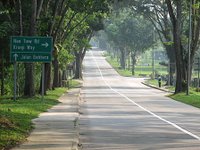 I cycled down the vast and quiet Lim Chu Kang Road and turned into Neo Tiew Road. This time round, i decided to cycle into every minor lane to explore the area. My grandparents used to live somewhere in this area where they had houses on either sides of the narrow road. One part of it in fact served as some sort of warehouse for my aunt and uncle's garment business. Then the government relocated all the residences and now, all that's left are rehabilitated agri-farms and the like. Apart from these neat rows of farms, the area is mainly covered by greenery - grasses, shrubs, trees. Not much to see, yes, but one appreciates the scenery and quiet of the surroundings. My only fear was the stray dogs that roam the area. There was one which lay lanquorously in the middle of a road that was quite far in from the main road. I suppose that's a sign which says, 'Scram, this is MY territory'. I heeded the imaginary warning and steered clear of the road.
I cycled down the vast and quiet Lim Chu Kang Road and turned into Neo Tiew Road. This time round, i decided to cycle into every minor lane to explore the area. My grandparents used to live somewhere in this area where they had houses on either sides of the narrow road. One part of it in fact served as some sort of warehouse for my aunt and uncle's garment business. Then the government relocated all the residences and now, all that's left are rehabilitated agri-farms and the like. Apart from these neat rows of farms, the area is mainly covered by greenery - grasses, shrubs, trees. Not much to see, yes, but one appreciates the scenery and quiet of the surroundings. My only fear was the stray dogs that roam the area. There was one which lay lanquorously in the middle of a road that was quite far in from the main road. I suppose that's a sign which says, 'Scram, this is MY territory'. I heeded the imaginary warning and steered clear of the road.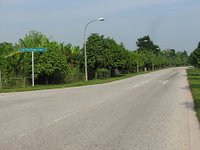
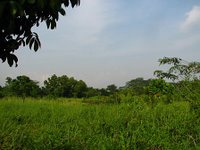
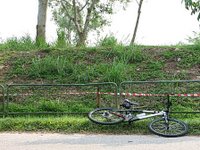
As i cycled on, i saw a group of scouts trudging along the side of the road. It was a very familiar sight, for i was once wearing the uniform, including that ubiquotous red scarf which i rather disliked putting on. Those guys look no older than 15 years old and all had a weary look on their faces. That's not surprising, for if i were in this god-forsaken place wearing a uniform and carrying a large bag walking under a hot sun, i wouldn't be looking excited either. But i'm sure there's learning value in their little expedition, and if they've got the right company for the journey, hiking can be very fun. Go, guys!
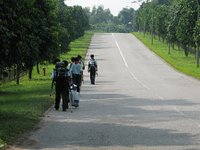
I came out to Neo Tiew Road, saw the Sungei Buloh Wetland Reserve sign, then made another left turn into the lane. I feel rather embarrassed that i've not been to Sungei Buloh, for i believe it is a tourist attraction and definitely one that is authentic and worthwhile to visit. But i, a citizen of this land, have never been there before. What a shame.
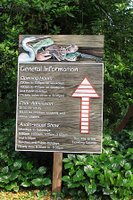
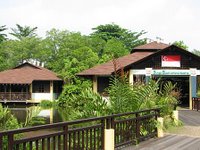
 I reached the entrance but didn't go in, not because i didn't want to pay the $1 entrance charge for adults, but because i wasn't properly attired and had nowhere to keep my bike. So i just loitered around the entrance area. And boy, were there things to see. I told myself there and then, 'i'm definitely coming here some day - inside, not just the entrance.'
I reached the entrance but didn't go in, not because i didn't want to pay the $1 entrance charge for adults, but because i wasn't properly attired and had nowhere to keep my bike. So i just loitered around the entrance area. And boy, were there things to see. I told myself there and then, 'i'm definitely coming here some day - inside, not just the entrance.'Below: View of Kranji Way. Our neighbour up north is in full view from the beach.
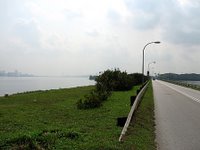
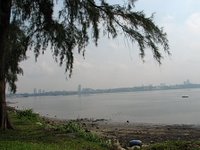
Sunday, June 25, 2006

I might write about the trip sometime later. For now, i shall let the photos do the talking. I took many pictures on my powershot S2, which is the bulkiest camera that was brought for the trip. Actually, my camera is unfailingly the biggest compared to others', not matter which group of friends i'm with or the occasion. No one (unless he's a professional photographer) really would want to lug such a big (non-SLR) camera around for social gatherings, much less a cycling trip. It's just inconvenient and undesirable. Because it is so conspicuously and unenviously big, people always wonder why i bought it in the first place. It makes me look pro, but pro i am not. I tell others the 12x zoom is a draw, and in return they would ask me, 'Whatever for do you need the 12x zoom? To look into your neighbours' homes, right?'
Most of the group photos were taken using my camera, not because i have the best camera around, but because i was, as always, the most thick-skinned one who would unashamedly go round asking people to pose for photos and bothering passers-by to be our photographer. I've already received Chin's and K's photographs, and i'm waiting to collect from the rest their photos, so that i can compile everything, including a couple of video clips, together and distribute copies to everyone.
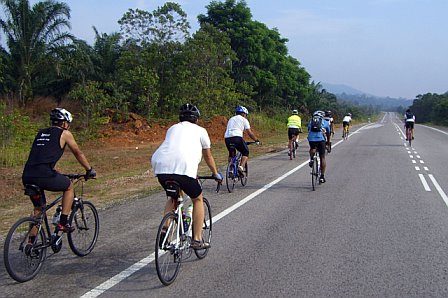 No buildings in sight. It was lovely - just us on the road, trees by the roadside, and a cloudy blue sky above. Taken on K's camera.
No buildings in sight. It was lovely - just us on the road, trees by the roadside, and a cloudy blue sky above. Taken on K's camera.
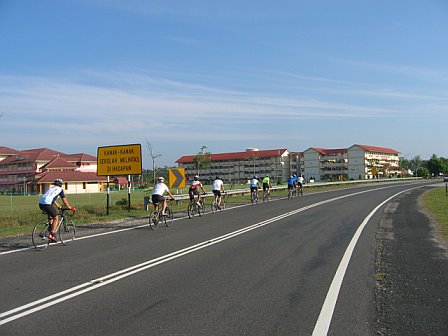 Riding past a school building, i think. The luscious space and the wide open roads were reassuring and inviting. Chin often cycled far ahead and stopped by the side to take photos of us cycling past, as he did for this one.
Riding past a school building, i think. The luscious space and the wide open roads were reassuring and inviting. Chin often cycled far ahead and stopped by the side to take photos of us cycling past, as he did for this one. A panoramic view of the landscape we often ride past. Courtesy of Chin.
A panoramic view of the landscape we often ride past. Courtesy of Chin.
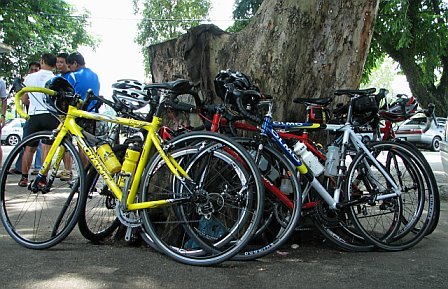 The roadies' bikes leaning against a tree by the eatery that we stopped at for lunch. I think, it was Eug and Ken who prompted me: 'You should take a photo of the bikes. Very nice.'
The roadies' bikes leaning against a tree by the eatery that we stopped at for lunch. I think, it was Eug and Ken who prompted me: 'You should take a photo of the bikes. Very nice.'
 I only knew this was taken when i looked through K's photographs for the trip. It was during our recce. i believe we stopped here to ascertain our rest-point for the ride. The road runs alongside the coast for this stretch.
I only knew this was taken when i looked through K's photographs for the trip. It was during our recce. i believe we stopped here to ascertain our rest-point for the ride. The road runs alongside the coast for this stretch.
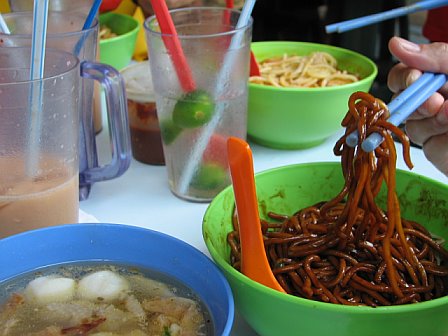 No ride is complete without makan. When the drinks came, i was like, 'So, this is lime juice. Luckily i didn't order it.' But the laksa was good. I ate all the (black) cockles in my laksa, while most of the others gave theirs to Daniel, who was only too happy to accept them.
No ride is complete without makan. When the drinks came, i was like, 'So, this is lime juice. Luckily i didn't order it.' But the laksa was good. I ate all the (black) cockles in my laksa, while most of the others gave theirs to Daniel, who was only too happy to accept them.
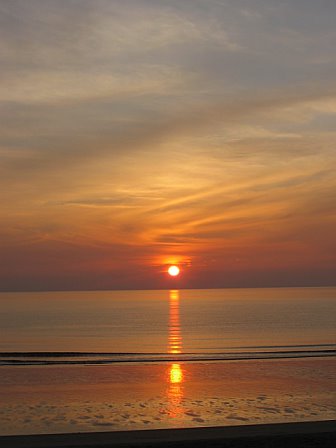 2nd day morning, around 7a.m. This is the east coast so we get the view of sunrise. Chin and a few others stopped their breakfast and ran out to the beach to snap photos when they saw the sun rising from the horizon. This is his. I didn't bring mine to breakfast, unfortunately. If not i can show them the power of 12x zoom!
2nd day morning, around 7a.m. This is the east coast so we get the view of sunrise. Chin and a few others stopped their breakfast and ran out to the beach to snap photos when they saw the sun rising from the horizon. This is his. I didn't bring mine to breakfast, unfortunately. If not i can show them the power of 12x zoom!
Saturday, June 24, 2006
I ran
Nevertheless, i quite enjoyed the run this evening. At the very least, or so i imagined, my fitness has not dropped to the level which the army would frown upon. I wasn't panting breathlessly, nor did i find myself wanting to slow down or stop altogether during the run. The brilliant evening was highly conducive for jogging, and because it was an industrial - and deserted - area i was running through, plus the fact that it was quite late, i was the only jogger around.
I was running on a track next to a canal, and i continued running as long as the path ahead of me doesn't end. It didn't bother me how far and where the running track would take me to; i just kept going, savouring the quietude of the surroundings (there were few people but plenty of trees; and the sky's gradually turning darker) which i've never before come across, and enjoying the experience of running on a completely new route, knowing that the next time i run the feeling will be no more.
It's always like this: once you become familiar with a route and the surronding features, there is a somewhat inevitable reduction in the sense of pleasure you get from running the second, third time and so on. The activity simply becomes repetitive. I am not one who is motivated to run for the sake of running alone; i need some form of motivation, and the sights and sounds that greet me while running, allow me to actually enjoy the run, which otherwise would be just a boring exercise. Ironically, to enjoy running one would have to do it often enough, because this would improve one's cardiovascular endurance, making the run 'easier' and less tiring. But, as with many things, making that first step and keeping the momentum thereafter proves to be the hardest. It's not surprising athletes are individuals who exercise tremendous self-discipline.
That's why yours truly isn't an athlete, and will never ever become one. heh.
Wednesday, June 21, 2006
serenity on the road
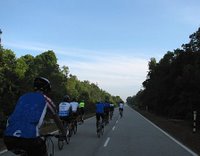 The lovely blue sky, the sparse, fluffy white clouds, the rustic charm evoked by the kilometres of greenery that roll past, almost effortlessly and imperceptibly, that it seems as if one is moving through a changing scenery in constant motion.
The lovely blue sky, the sparse, fluffy white clouds, the rustic charm evoked by the kilometres of greenery that roll past, almost effortlessly and imperceptibly, that it seems as if one is moving through a changing scenery in constant motion.Cycling on the straight, narrow road leading to the main road, there is a serene feel to the tranquil atmosphere. The sun's rising fast to its mid-day position; the road is, for the most time, empty, flanked by closed vegetation and trees throughout the stretch; and from far, it seems as if the flat road continues forever. It's a comforting prospect.
Hands on the handlebar, i turn and look at the passing scenery on both sides, careful to enjoy the moment, as though once past it would elude me forever, dusted down into oblivion.
When we cycle past kids who live in kampung houses just along the roadside, they giggle and laugh heartily, waving eager hands at us, shouting excitedly to cheer us. These are no urban areas; often it's just a stretch of civilisation that spreads intermittently on either side of the road, with no modern-looking buildings or amenities in sight. The people must be living a simple life, and the kids most certainly live a different kind of childhood from ours: Theirs is a carefree and simple lifestyle, not without its fair share of problems, but untainted by competitive, stressful education.
Except for a small stretch where we cycled through relatively light rain, we were lucky not to be caught in any downpours while on the road. The roads are in good condition, the landscape scenic, the company a good bunch of people who share the same passion and who have a good many jokes to share. One really can't ask for more. One only hopes that this can be done more often, with the company of these great fellas who know what exactly it feels like to be riding a bike on the road, past scenery that is rare (at least in Singapore) but immensely delightful.
Tuesday, June 13, 2006
i like the night better
K says he enjoys cycling at night: the air is chilly, cool; a very soothing and plesant feeling. He likes cycling across the Kranji dam, where Johore can be seen just across the sea. 'Very surrealistic,' says K with a wry smile. It's as if one is at the edge of our tiny island; cycling on home ground, the view of Johore passes by in mere seconds. Our neighbour's really not very far from us - it's, well, separated and linked to us by a causeway that is burdened with the history of disputes between the two neighbours.
It's a downslope when we come to the end of neo tiew road at the junction that links with lim chu kang road. On the left side of the road, there's a structure, a sort of temporary building that holds the living quarters of a sizable number of foreign workers. It's most probably overcrowded; a cursory glance from the road tells one that the living conditions are likely to be unpleasant, sordid even. The contents of their quarters, their clothes and belongings, are bursting out from the interior. The latrines, which appear to be sited just next to where they stay, are repungant; almost instantly one is greeted by the stench when cycling past the place. But such are the living conditions for these workers, who amongst them are Indians, Bangladeshis and Maindland Chinese, i reckon.
I am cycling at a far-flung corner of the island, where the inhabitants are wild animals and norturnal creatures in the jungle, and quite a couple of stray dogs. What can one expect these workers to do after a long, hard day of work, which probably involves labouring under the sweltering sun in the day? There is no entertainment and there's nothing to look forward to except yet another day of dreadful work. Perhaps the only comfort is that they are earning money which is needed to feed their families back in their homeland, and this must be a pillar of motivation for them, if not the only one. Going down the slope, i cycled past many who were sitting by the side of the road; some were alone, others with their friends, chatting. At night it's when they finally have time to themselves, to rest their tired and probably overworked bodies. Yes, the night is in many ways better than day: It's cooler, quieter, less harsh; it gives one solace.
We ended our ride at Fong Seng. The time was nearly 1130, but we were still earlier than last week. As usual i ordered iced-milo. This one was just as bad as last week's: there's more ice than milo and i finished it very quickly. Then i ordered a can of 100plus: this one can't go wrong for sure.
A lady walking next to a man just reached the prata shop. Then she smiled and waved at me - well, she looked like she was waving at me. So i waved back, fearing that if indeed i was the recipient, it would be very impolite if i did not acknowledge her greetings. It was good she didn't approach me. For the next minute or so i tried recalling who she is. Ahhh....It's Ps, i suddenly recalled. She had trained with us for the K.L. ride more than a year ago. In the end she couldn't go for the trip because she couldn't afford to take leave. A mountaineer and an outdoorsy lady, she's one of a group of female Singaporeans who are going to scale Mt Everest. Actually, i don't know if they have already done it or are still training for it. But i recall she's one tough lady, very fit. She's also very pleasant and affable; I've had nice conversations with her. When we were leaving, i thought it polite to approach her and say hi. I must have looked silly, for instead of calling her name, i went past her and made myself conspicuous in front of her. Well, i just wanted to make sure i got the right person! I did, and we chatted quite a while until i remembered K and Chin were waiting for me at the roadside. We parted ways and i cycled the boring route towards home.
No change in upgrading policy
One can therefore assume that this reaffirmation of upgrading policy was committed after the PAP had done its post-morterm analysis of the GE results, which includes its embarrassing defeat in the two opposition wards. What, then, made the PAP government decide to stick to the policy, despite the protest and displeasure of seemingly a large segment of the electorate with regard to the perceived unfairness of the upgrading policy? From letters to the ST Forum as well as online discussion, it would seem that a sizable majority of Singaporeans, be they PAP supporters or anti-PAP, are clearly in disapproval of using upgrading as an election tactic. Many Singaporeans are incensed that the two opposition wards are unfairly neglected and denied upgrading simply because they are represented by opposition parties. Upgrading, they argued, should not be a political issue exploited by the party in power; the funds for upgrading are government (which is different from party, nevermind that the government is almost synonymous with the PAP) funds which all tax-paying Singaporean voters - regardless of where they live - deserve access to, on a fair and equal basis.
From the front page article "Upgrading for all wards, but PAP ones first":
"But in an interview with the Sunday Times on Friday, Mr Mah made it clear that this review would not affect the policy of giving lift upgrading priority to PAP wards. "There is no change, that policy still remains. We've looked at it and we believe that that is still something we have to do," he said.
"Giving PAP wards priority does not mean that the Government intends to deprive opposition wards of upgrading, he added, although this point might have been lost in "the heat and the noise of the elections"."
Sure, there are many other blocks in PAP wards which are older than the two opposition ones. But the question is how the criteria is applied to determine which precincts come first for upgrading, which comes second, and which last. What is an equitable basis to select precincts for upgrading, given that there are three criteria employed by the Ministry? Do they all take equal weight in the consideration, or is one more important than the other? Because it seems that at the end of the day, it is the third criteria - support for government - which solely affects the chances of opposition wards receiving funds for upgrading. Mr Mah conceded much when he says, "I can't put the opposition blocks at the head of the queue, ahead of these 800. Surely not (Sunday Times p. 1)." The critical factor here is not age or geographical spread, but 'opposition'.
The PAP, of course, does not deny that voting is linked to upgrading. Their justification for PAP wards getting priority for upgrading is that upgrading is a major election platform for the PAP and they, when voted into power, had to fufill their duty to their supporters. Mr Mah says that this is only fair to the residents who had voted for them:
"Some people say that it is not fair that we link votes to upgrading. Let us look at it from the point of view of those who voted for the PAP. Upgrading has been a major election platform of the PAP. PAP candidates have promised their residents that they will upgrade their estates if they are elected. Once elected, residents expect them to fulfil their promise. So, i would argue that it is not unreasonable for these residents to be in front of the queue for upgrading, if they have supported the PAP candidates. After all, if we did not have people voting in the PAP candidates, you would not have the PAP Government and its policies to generate the surpluses to finance the upgrading programme." (The Sunday Times, p. 10)
But, just as revealing, if not more, is the last statement made by Mr Mah: 'After all, if we did not have people voting in the PAP candidates, you would not have the PAP Government and its policies to generate the surpluses to finance the upgrading programme.' This smacks of self-righteousness. True, the PAP Government is capable and has done well to generate surpluses so important for financing the upgrading prgramme. Yet is it not the business of every government of the day to do its best economically and improve the livelihood of all citizens, not just of those who voted for the ruling party? Let it not be forgotten that in every constituency that the PAP won there is a sizable minority which voted for the opposition, just as in the two constituency where the opposition won, there are many who voted for the PAP. The Government is in power because voters had put them there; but after the government comes into power it should exercise governmental responsibility in a non-partisan manner, fairly to each and every citizen, and every residential ward. This includes ensuring that precincts in need of upgrading get government funds for that purpose.
At any rate the most interesting question that arises from the report is this: Given the earlier impression that the PAP had called for a review of its strategy in the opposition wards to reconsider the effectiveness of upgrading as an election tactic, why has it decided to continue with the policy, despite its apparent failure?
I offer here a few plausible reasons.
1. Contrary to popular belief, the upgrading policy to win votes is not quite a failure. Yes, it failed to win Hougang and Potong Pasir from the opposition hands, but it continues to retain the votes in other wards that have been dominated by the PAP. In the just ended GE, it is likely that the upgrading policy continues to play a role in affecting voters' decision. The physical state of the two opposition wards remain glaring examples of the price voters would pay for supporting opposition parties, and voters from PAP wards are not oblivious of that consequence.
Further, that Mr Mah is 'surprised bread and butter issues not top concern' (p. 10) is telling of the government's perception of voting patterns and interests. If his views are representative of the government, it is clear that the PAP does not buy into the findings of the Institute of Policy Studies, which found that most voters 'value an efficient government and fairness in policies over bread and butter issues'. According to Mr Mah, his and other PAP MPs' interactions with their residents shows that many people are still concerned with jobs, cost of living and 'things like lifts, facilities'. Therein, the upgrading policy still holds sway with voters. It may not be able to win back the opposition wards, but it has been able to prevent others from switching to the opposition.
2. As Mr Mah himself said, upgrading was an election platform for the PAP. The PAP can ill afford to make a U-turn on the policy by giving preference to the opposition wards. The minister took pains to stress that the age of blocks and their geographical spread are factors that play a role in deciding which ward gets upgrading first. But he also made it known, unambiguously, that PAP wards would come first. To make any concessions or tweak the policy would be tantamount to going back on its promise, and the upgrading policy would be rendered redundant. This would make the PAP come across as not credible.
3. The PAP failed to win over the majority of Hougang and Potong Pasir voters not so much because the upgrading policy had failed, but because voters there have developed a sense of solidarity with and loyalty to their MPs, Mr Low Thia Kiang of the Worker's Party and Mr Chiam See Tong of the Singapore Democratic Alliance, respectively. The snippets of interviews done by the ST with voters from the two wards often bear this out. This factor probably outweighs the carrot of upgrading in winning voters' hearts and minds. In not changing the upgrading policy to favour the opposition wards, the PAP probably recognised that the crux of their failure lay not in the upgrading policy: Indeed, they have to go beyond that to win back the opposition wards.
4. Adherence to the upgrading policy does not imply that the PAP is giving up on the two opposition wards. Nor is the PAP in any doubt that the upgrading policy failed to win the two wards. Instead, the PAP appears to have made up its mind to make upgrading a peripheral issue by the next GE. For Mr Mah mentioned that the government has pledged that 'by 2015, all HDB blocks will have lifts that stop on every floor, with the exception of a small number of blocks whose designs make such works too costly (Sunday Times p. 1).' Given that the next GE is due by 2011, by then, lift upgrading would hardly be a bone of contention in the elections, since by 2015 all eligible HDB blocks, including those from the present opposition wards, will have or are slated to receive lift upgrading.
Therefore, what remains to be seen is not the issue of upgrading, but what new strategies the PAP will engage to retain its dominance against the rising popularity of the Worker's Party, as well as to win the two opposition wards in the next GE.
